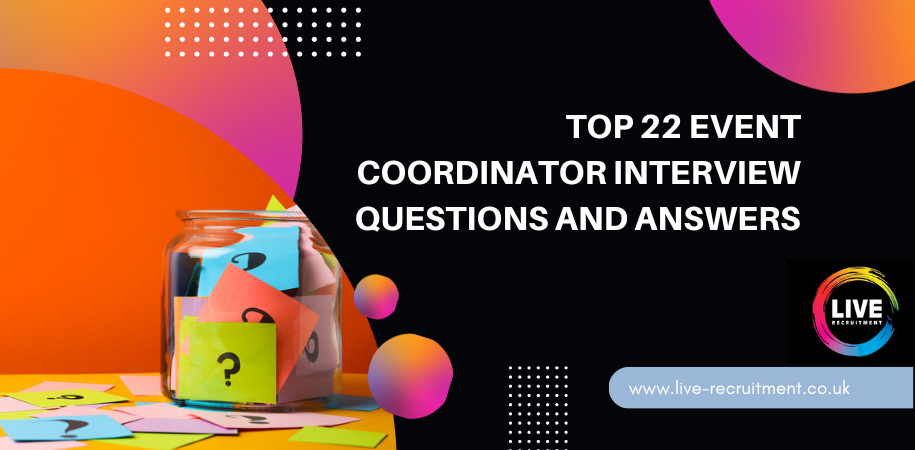The events sector is incredibly competitive, which means you need to show up ready to impress in an interview setting. Proper preparation is the best way to ensure you are ready for anything they can throw at you. And preparation means anticipating the questions you might be asked and crafting the ideal answer.
If you get nervous in interviews or often leave feeling like you didn’t say everything you wanted to say, then this interview preparation method is ideal for you. It will help you to feel in control and ready for whatever the interview panel asks.
In this guide, we’re sharing 22 of the most popular questions you could be asked in an event coordinator interview. We’ve also provided sample answers so that you know what kind of answer they are looking for. Remember to update your answers to reflect your own knowledge and experience.
The top 22 event coordinator interview questions
Tell me about yourself.
This might sound like a simple question, but it’s important to stay focused and give a succinct answer to the question. Explain your education history and your work history, and then give a brief overview of the next step in your career.
Tell us about your experience in the events industry.
Again, this question is to test your knowledge and give you an opportunity to sell yourself. Talk about the type of events you have experience with and the size of the events. Also, mention any unique or difficult aspects of the events you have coordinated.
What has been your most successful event to date and why?
This question allows you to demonstrate your skills and highlight your successes. Be sure to include information about the event, such as the size and scope. It doesn't have to be your largest event, it could simply be one that allowed you to demonstrate your unique skill set. Don’t forget to answer the “why” part of this question. This will allow you to show what success means to you.
What do you think are the essential ingredients for a successful event?
This is a great opportunity to share your experience and show off your problem-solving skills. Mention things like adequate planning, a great team, attention to detail and communication.
Describe a time when you had to deal with a difficult or challenging situation during an event.
With any question that asks you to describe a time or situation, you should answer using the STAR method. This stands for Situation, Task, Action and Result. This will help you to formulate your answers very clearly and ensure you don’t miss out on any important information.
How do you deal with last-minute changes or cancellations?
When answering this question, make sure you give an example of a time when this has happened to you and you have successfully managed this disruption. If you have struggled with this in the past, you can say where this has gone wrong for you before and what you have learned from the experience.
What do you think is the most important skill for a successful events coordinator to have?
This is your chance to show that you know exactly what it takes to be successful in this field. You can show that you understand what is expected of an events manager by accurately selecting a personality trait or skill that sets you apart from the competition. Remember to back this up with an example of how this skill has served you in the past.
What do you think sets you apart from your competitors?
This question asks for you to be self-aware about your own skills and also your shortcomings. You need to think carefully about what you bring to a role that other people may not be able to offer. This could be your creativity, an organisational system, or a checklist you have developed to ensure success in event planning.
How do you manage supplier relationships?
This question implies that you have already had to manage supplier relationships. If this isn’t something that has cropped up in a previous role, then you need to demonstrate your understanding of what is required. You could talk about time spent shadowing more senior event managers and what you learned during this time.
Can you describe a time when you had to negotiate with a supplier?
Again, this implies that it’s something that has been part of your role in the past. Either give them an example of when you have personally managed the negotiations or demonstrate your knowledge by sharing a time when you have been closely involved with this.
What are your thoughts on social media for events?
This is an opinion-based question and there are no right or wrong answers. However, if you know the company is pro-social media for events, then you might want to lean towards framing this in a positive light. However, if you have a good reason to disagree with their policy, don’t be afraid to have your own opinions.
How do you budget for an event?
This question is quite technical and requires you to share the actual systems and processes you use to do your job. You can use examples of how you have approached this challenge in the past.
What are your thoughts on using sponsorship to fund an event?
Opinion-based questions are not designed to trip you up. They are an opportunity to share your insight on the sector and also demonstrate your commercial awareness. With this answer, you could say that you know that sponsors are necessary for some events, but this needs to be balanced with the need to focus on the visitor experience.
Do you have any experience working with sponsors?
They might not want to know your opinion on sponsors. Instead, they might simply want to know how you have worked with them in the past. If you have never had to deal with sponsors, be honest about this.
Can you tell us about a time when you had to manage a crisis during an event?
It’s a good idea to have a few different stand-out situations that you can talk about. This could include when things have gone good and when they have gone bad. By coming up with a few different examples, you’ll be prepared for any of these situational job interview questions.
How do you evaluate the success of an event?
This is an opportunity to demonstrate what means the most to you. Are you the kind of event coordinator that is more concerned with commercial success or visitor experience? Do you just want the client to be happy, or do you need to feel creatively fulfilled?
What steps do you take to ensure customer satisfaction?
The assumption with this question is that customer satisfaction is the most important thing to you. This suggests that they are looking for someone who will go above and beyond for their clients, so make sure you demonstrate how you would achieve this.
How do you deal with difficult or unhappy customers?
This is an opportunity to show that you know how to communicate and diffuse a situation when things get tense. Think about an example of how you have achieved this in the past. For example, you might say, “I once had to take over an event after a colleague left the company unexpectedly. The client had been left with very unrealistic expectations, so I had to reassure them that we could still create a memorable event, but that some things would have to be reimagined. They were understandably unhappy with this turn of events, but through careful communication, I was able to reassure them.”
What is the biggest challenge facing the events industry at the moment?
This one is asking for your commercial awareness and analysis to shine through. You could link this answer to a piece of the industry news you have read recently to make it even more evident that you are confident discussing the industry as a whole.
Can you tell us about a time when you had to think outside the box to solve a problem?
When answering a question like this, you don’t have to stick to an employment-based situation. For example, if you helped plan a sibling’s wedding, you could offer an example of creative problem-solving from this experience.
How do you deal with failure?
There’s little sense in pretending you have never failed at anything in life. How we deal with failure is often just as illuminating as how we cope with success. Be honest and open about how failure affects you. If you struggle to cope when things don’t go your way, then think about what you are doing to improve this type of reaction.
Do you have any questions for us?
At the end of the interview, you should have the chance to turn the tables on them and ask questions about the company and the role. Make sure you have prepared a few insightful questions that will tell you more about if this job is right for you. Remember, an interview is a two-way conversation.


